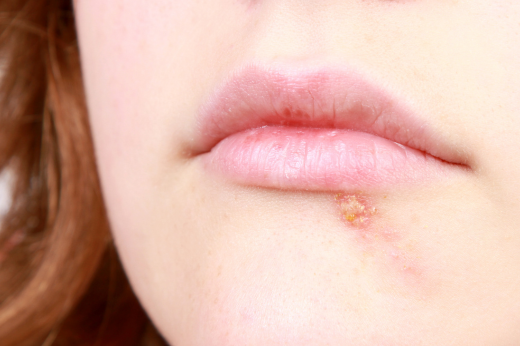
Cold sores or fever blisters are common viral infections. These are tiny fluid-filled blisters on and around your lips. However, they may also form on the chin, cheeks, or in the nostrils, as well as the gums or the roof of the mouth. These skin conditions usually result from infection with the Herpes simplex virus type 1 and type 2. Cold sores usually cause pain, burning sensation, or itching before bursting and crusting. This condition is highly contagious and can easily spread from one person to another through contact in the form of kissing or sexual intercourse. Although there is no cure for cold sores, treatment can help manage the outbreaks. Prescription antiviral medicines or creams can help heal the sore more quickly.
Keep reading this informative blog to explore everything about cold sores, their causes, symptoms, diagnosis, and management.
A cold sore is a single or cluster of fluid-filled blisters often appearing on your lip and around your mouth. However, they can also appear on your chin, cheek, nose, and gums. Cold sores are also known as oral herpes and herpes simplex labialis, caused by type 1 and 2 herpes simplex viruses. Cold sores are highly contagious and can easily spread to your genitals and other people through direct contact in the form of kissing or sexual intercourse.
This skin condition can develop multiple times a year or only once or twice in a lifetime. Anyone can develop cold sores, regardless of age, but the risk decreases after age 35.
Cold sores are called oral herpes since they are caused by the herpes simplex viruses 1 and 2. This highly contagious virus can spread through saliva or close contact, often through kissing or sharing utensils, straws, and towels with someone infected by the virus.
Once the virus enters your body, it never goes away and remains dormant or inactive in a group of nerve cells for several years. Thus, most remain unaware of having the virus for months or even years after exposure. However, when something triggers the virus, it may activate and cause sores.
A variety of factors can activate a cold sore, including:
Cold sores resemble small blisters on your lips and around your mouth. You may experience the following cold sore stage:
Stage 1
Stage 2
Stage 3
Stage 4
Stage 5
Untreated cases of cold sores can develop into the following complications:
Eye Infections
Genital Sores
If you experience a cold sore, your doctor may refer you to a dermatologist (a doctor specializing in the diagnosis and treatment of conditions related to the skin, hair, and nails). The dermatologist can easily detect a cold sore by its appearance and location. Furthermore, a swab test of the fluid may be done to confirm the presence of the herpes simplex virus.
You cannot cure cold sores. Once you have them, you have them all your life. The main objective of treatment is to heal the outbreaks and prevent further ones.
Cold sore treatment may include:
To avoid getting HSV-1, you should take the following precautions around people who have cold sores:
If you are already infected, take the following measures to prevent outbreaks:
Cold sores, also known as fever blisters, are caused by HSV 1 and 2. They result in round, red blisters containing clear or yellow fluid. Though the virus remains dormant for years, it can be triggered by several factors, such as fever, stress, extreme temperature changes, or hormonal fluctuations. But remember, HSV infection can never be cured. Treatment with antiviral medications can only manage outbreaks. If you notice any prominent blister on your lips, near your mouth, or genitals, contact your doctor immediately!